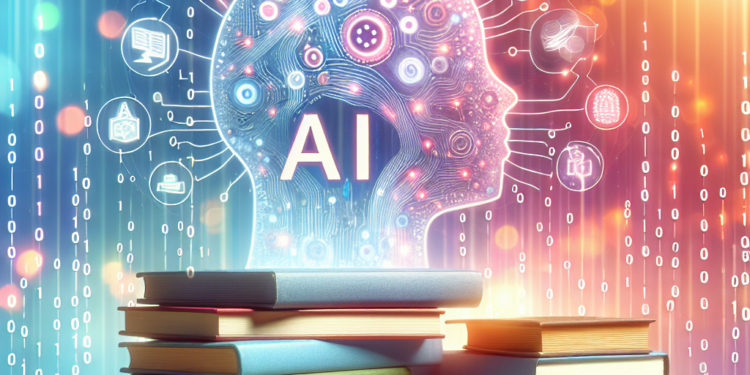Artificial intelligence (AI) is a field that has been growing rapidly in recent years, with advancements in technology enabling machines to perform tasks that traditionally required human intelligence. With the rise of AI, more and more people are becoming interested in learning about this field and its potential applications. For beginners looking to delve into the world of AI, there are a plethora of books available that cover the basics of AI and its various applications. In this article, we will explore some of the top AI books for beginners.
1. “Artificial Intelligence: A Modern Approach” by Stuart Russell and Peter Norvig
Considered by many to be the bible of AI, this book provides a comprehensive overview of the field. It covers a wide range of topics, from basic AI techniques such as search algorithms and machine learning to more advanced topics such as natural language processing and computer vision. The book is written in a clear and accessible style, making it an excellent resource for beginners looking to gain a solid understanding of AI concepts.
2. “Machine Learning for Beginners” by Joe Natoli
Machine learning is a subfield of AI that focuses on developing algorithms that enable machines to learn from data. This book provides a gentle introduction to machine learning concepts, making it ideal for beginners with little to no prior knowledge of the subject. The author explains complex concepts in a straightforward manner, making it easy for readers to grasp the basics of machine learning.
3. “Python Machine Learning” by Sebastian Raschka and Vahid Mirjalili
Python is one of the most popular programming languages in the field of AI, thanks to its ease of use and extensive library of machine learning tools. This book provides a hands-on introduction to machine learning using Python, guiding readers through the process of building and training machine learning models. With practical examples and code snippets, readers will learn how to apply machine learning algorithms to real-world datasets.
4. “Deep Learning” by Ian Goodfellow, Yoshua Bengio, and Aaron Courville
Deep learning is a subset of machine learning that focuses on neural networks – a type of algorithm inspired by the human brain. This book provides a comprehensive overview of deep learning techniques, covering topics such as convolutional neural networks, recurrent neural networks, and generative adversarial networks. The authors explain complex concepts in a clear and concise manner, making it easy for beginners to grasp the fundamentals of deep learning.
5. “Artificial Intelligence Basics: A Non-Technical Introduction” by Tom Taulli
For beginners who are interested in AI but do not have a technical background, this book provides a gentle introduction to the subject. The author explains key concepts in a non-technical manner, making it accessible to readers with little to no prior knowledge of AI. Topics covered include machine learning, neural networks, and natural language processing, providing readers with a solid foundation in AI fundamentals.
6. “The AI Advantage” by Thomas H. Davenport
In this book, the author explores how AI is transforming industries and reshaping the business landscape. Davenport explains how companies can leverage AI to gain a competitive advantage, improve operational efficiency, and drive innovation. With case studies and real-world examples, readers will gain valuable insights into the practical applications of AI in business.
7. “Human + Machine: Reimagining Work in the Age of AI” by Paul R. Daugherty and H. James Wilson
This book examines the impact of AI on the future of work, exploring how humans and machines can collaborate to achieve better outcomes. The authors discuss how AI is reshaping jobs and industries, and provide practical strategies for organizations to thrive in the age of AI. With insights from leading companies and thought leaders, this book offers a comprehensive look at the potential of AI in the workplace.
8. “Life 3.0: Being Human in the Age of Artificial Intelligence” by Max Tegmark
In this thought-provoking book, the author explores the implications of AI on society and humanity. Tegmark discusses the potential benefits and risks of AI, and raises important ethical and philosophical questions about the future of artificial intelligence. With a blend of scientific research and philosophical inquiry, this book offers readers a compelling look at the impact of AI on our lives.
9. “Superintelligence: Paths, Dangers, Strategies” by Nick Bostrom
This book delves into the concept of superintelligence – a hypothetical form of AI that surpasses human intelligence. Bostrom explores the potential risks and benefits of superintelligence, and discusses strategies for ensuring a safe and beneficial outcome. With a focus on the long-term implications of AI, this book provides readers with a thought-provoking look at the future of artificial intelligence.
10. “Artificial Unintelligence: How Computers Misunderstand the World” by Meredith Broussard
In this book, the author examines the limitations of AI and the challenges of designing intelligent systems. Broussard argues that many AI systems are based on flawed assumptions and oversimplified models of the world, leading to errors and biases. With examples from real-world applications, the author highlights the importance of understanding AI limitations and designing systems that are truly intelligent.
In conclusion, these are just a few of the top AI books for beginners that cover a wide range of topics in artificial intelligence. Whether you are interested in learning the basics of AI, exploring machine learning techniques, or delving into the ethical and societal implications of artificial intelligence, there are books available to suit your interests. By reading these books, beginners can gain a solid foundation in AI concepts and explore the exciting possibilities of this rapidly growing field.













